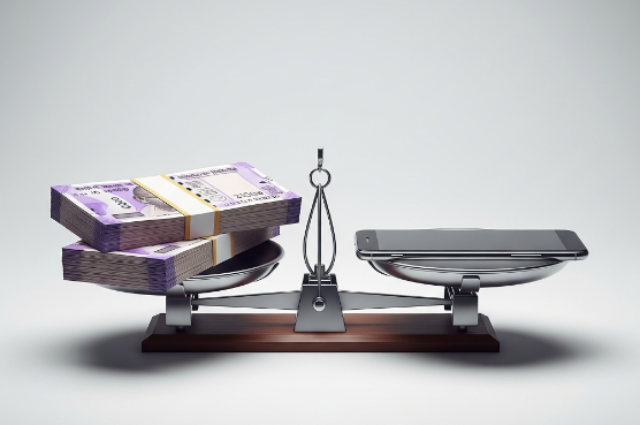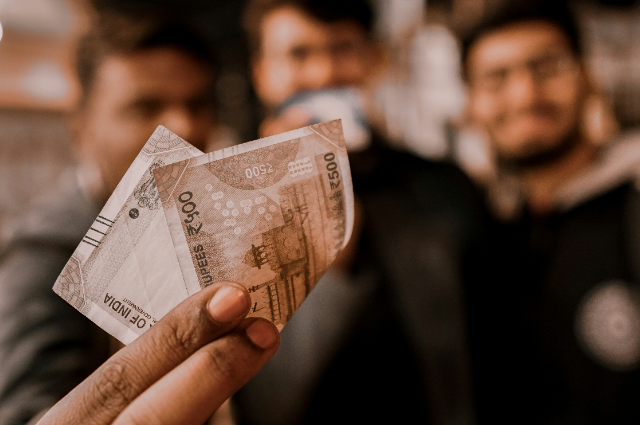
Image- The financial balance: Cash or digital payments? ( Image created using an original prompt on Gemini.)
Save money. Keep some cash handy. Save cash; it will save you. These are not messages from any digital app reminding us to save money, but rather the enduring wisdom often heard in everyday life.
While the entire country is advocating for digital payments because they are so quick and efficient, the question is: Are digital payments savings-efficient?
We all have a relationship with money and that relationship shapes our financial health. It’s the same hard-earned money for everyone but spending it without seeing or touching it can drastically change your financial health. With cash, every penny you spend reminds you of how hard you worked for it and how many hours of your life went into earning that amount.
And even if you’re a student, it brings back the image of your family’s struggles, their silent sacrifices, and the value of every rupee. Cash creates awareness of how much you have, how much you need to save, and what might happen in an emergency. But all those attachments quietly fade away when we’re just swiping with our fingers.
Cash reminds us not just of the price of the product, but the true cost of earning that product. That’s why we tend to remember prices longer when we pay in cash and forget them easily when we shop online. The prices may seem similar, but the financial behaviour changes.
With digital payments, every transaction feels small or urgent. Every subscription feels necessary, every food order seems like a harmless exception “just one more day.” But when you finally check your balance, the compound effect hits you.
The COVID-19 pandemic changed the world. It didn’t just shake the health system, it broke the financial system. It was a time when even the financially well-off began to question their spending habits.
And it was the Indian middle class, with their years of quiet savings, who survived the wrath of pandemic uncertainty that suddenly befell them. Amid unexpected job losses, soaring prices, no other income sources, and extended payment deadlines, it was cash that ultimately saved them.
Digital payments are convenient and have surely made our lives easier. But do they teach us discipline? Do they remind us to pause before spending to think about emergencies, uncertainties, and rainy days? What if the transaction fails because of a poor network? What if your phone gets stolen or suddenly malfunctions? Do these systems ever urge us to set something aside just in case? And most importantly: Do digital payments protect you from the discomfort of borrowing from relatives or anyone else in times of crisis?
India is becoming a global tech hub and leader in digital payments. In just a few years, the way we do transactions and how we see transactions now have changed rapidly. According to a Times of India report, UPI transactions hit a record 1,868 crore in May 2025, amounting to ₹25.1 lakh crore, up from 1,789 crore in April. QR codes are now visible at every vendor’s stall, and UPI has become an integral part of daily life.
But cash never faded. Cash continues to be resilient. As per the Reserve Bank of India, the currency in circulation increased by 5.8%, with the total reaching ₹38.1 lakh crore in May 2025 about 11.5% of the country’s GDP, according to The Economic Times. This reflects a 2.4% year-on-year growth, mainly driven by strong rural demand and agricultural activity. It’s not wrong to say that while digital payments are growing cash is booming.
The point isn’t about debate. This is a much-needed conversation about awareness in how we spend, and whether we’re doing it thoughtfully, or simply because we no longer see the money leaving us. We need to understand that convenience can come at a heavy cost later. We’re already seeing stories of people taking instant loans through digital apps and falling into debt traps. Some have even lost their lives to the pressure. Seamless payments may seem “cashless,” but when they come at the cost of your peace, your dignity, or even your life the price is too high.
Cash gives us memory. It reminds us daily how much we have, how much we’re spending, and how much we need to save. It sends a silent but recurring message: if expenses happen daily, saving must happen daily too. Cash doesn’t fail when the network does. It doesn’t nudge you into mindless purchases or convince you that every subscription and flash sale is a need. It teaches you to pause, think, and then spend, not the other way around.

Photo by Ayaneshu Bhardwaj on Unsplash
This article isn’t against technology. It’s against the loss of discipline in earning and saving, all in the name of “progress” and “you only live once” culture. It’s a reminder especially for the younger generation that the way we see money today is not the way our parents saw it. And maybe it’s time we start seeing it the way they did with respect, with boundaries, and with a focus on our actual financial condition, not on the spending patterns of peers. Our parents often speak of money with reverence because every penny reminds them of how slowly it was earned, through patience and sacrifice. They understand the value of saving even the smallest amount over a long period of time.
Our generation, through no fault of our own, was born into a world of convenience, influence, and constant distractions. Everything around us is either told or sold to us as essential. Every click becomes another clickbait, another temptation disguised as urgent. With countless options at our fingertips, money vanishes within minutes. We call it a lifestyle change; they call it financial carelessness. And perhaps neither side is entirely wrong.
But somewhere in between, we have lost the power to pause, to stop and ask ourselves: Do I really need this right now? Or can I wait a little longer?
Because in the end, your savings are not mere numbers in a bank account. They reflect your financial security, your discipline, and the choices you’ve made along the way. And when the time comes, it is your savings that will be there to save you quietly, but most powerfully.
